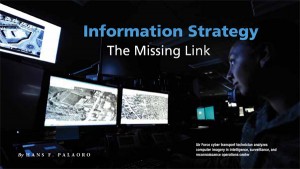
Lieutenant Colonel Hans F. Palaoro, USAF, wrote this essay while a student at the Industrial College of the Armed Forces. It won the Strategy Article category of the 2010 Chairman of the Joint Chiefs of Staff Strategic Essay Competition.
EXTRACT: While information power is well accepted as one of the four elements of national power, neither the term nor the concept appeared in the 2006 National Security Strategy. It is strangely absent from the “full array of political, economic, diplomatic, and other tools at our disposal” that is the basis of the document.4 Nor does information power appear in the 2008 National Defense Strategy.5 Moreover, although there is no vetted definition of information power, the concept is understood and the link to how the military should exercise it is obvious: information operations. Considerable attention has already been given to the “defensive” side of the information domain.6 What is still lacking is the offense.
The problem with the current IO model is that it fails to orchestrate the tools of information power toward a common goal. One reason is that the legal and bureaucratic limits on who can do certain things have caused an almost irrational phobia against integrated efforts. For example, fear of crosscontamination of public affairs (PA), public diplomacy (PD), and strategic communication with psychological operations (PSYOP) actively opposes effective coordination of these obviously interdependent tools of information strategy.
Tip of the Hat to Dale Mark Benedict at LinkedIn.

